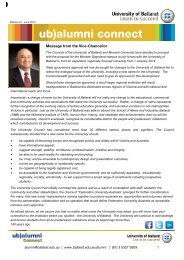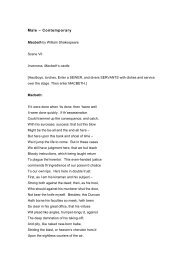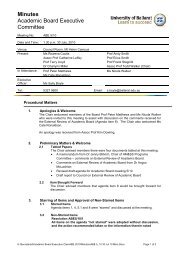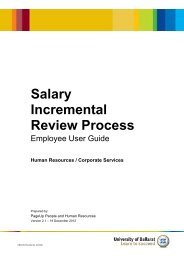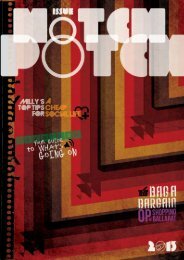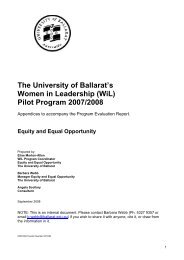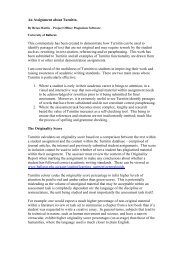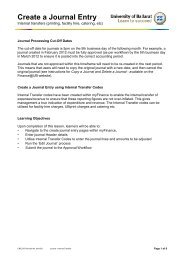Policy without (much) pain - University of Ballarat
Policy without (much) pain - University of Ballarat
Policy without (much) pain - University of Ballarat
- No tags were found...
Create successful ePaper yourself
Turn your PDF publications into a flip-book with our unique Google optimized e-Paper software.
<strong>Policy</strong> <strong>without</strong> (<strong>much</strong>) <strong>pain</strong>15. DraftingSome institutions have a policy-writing unit. In this case, writing and policy specialists draft policydocuments. In other institutions, it is up to the business owner <strong>of</strong> the policy area to do the draftingor have it done. This can be challenging for some staff and may result in varied styles <strong>of</strong> policypresentation. Central policy managers should provide resources such as templates, examplepolicies and writing tips to make clear how the institution expects its policies to read. Tips mayinclude points such as: use plain English, use the active voice, make definite statements.It is useful, but not essential, for a policy developer to have excellent writing skills. <strong>Policy</strong> textshould be clear, precise and unambiguous. It is better if the person primarily responsible forproducing the text can achieve this. Yet policy is a communal endeavour – others can refine thetext that the policy developer produces. The first priority for the policy developer is to understandwhat is needed and include this content in the policy, in a rational order. With regard to the writingitself, just do your best – but use each project as an opportunity to improve your writing skills.If you lack confidence in your writing, ask someone whose skills are known to be good to critiqueyour drafts. Pay close attention to the kinds <strong>of</strong> corrections they suggest. Are they correcting thesame thing repeatedly? Ask them to explain exactly why they are making these corrections –then, next time, anticipate their advice by making such corrections. Consult style guides toimprove your style. Enrol in a pr<strong>of</strong>essional development course on effective writing. Enhancingyour writing skills can only benefit your career.What sort <strong>of</strong> policy style does your institution prefer? Is there an institutional style? Is there aglossary <strong>of</strong> terms and definitions you should draw on for the ‘definitions’ section <strong>of</strong> your policy?Having these resources on hand can save time and alleviate the anxiety <strong>of</strong> having to start awriting task from scratch.Write early and <strong>of</strong>ten: this advice commonly given to thesis students is good for policy developersas well. Developing a rough draft <strong>of</strong> points for possible inclusion in the policy during the researchphase will focus your reading. It will also mean that you are well prepared to provide points andoptions to consultation workshops for discussion. <strong>Policy</strong> writers too can suffer writer’s block if theywait until research and consultation are finished, before starting to draft.<strong>Policy</strong> text is a genre <strong>of</strong> its own. The style is meant to be almost invisible, transmitting the content– the principles and requirements – as directly as possible. Yet very different styles <strong>of</strong> writing areto be found on institutional policy websites. Some endeavour to achieve a highly accessible,simple style, particularly in student-facing policies. Other, more traditional institutions prefer a~ 28 ~



